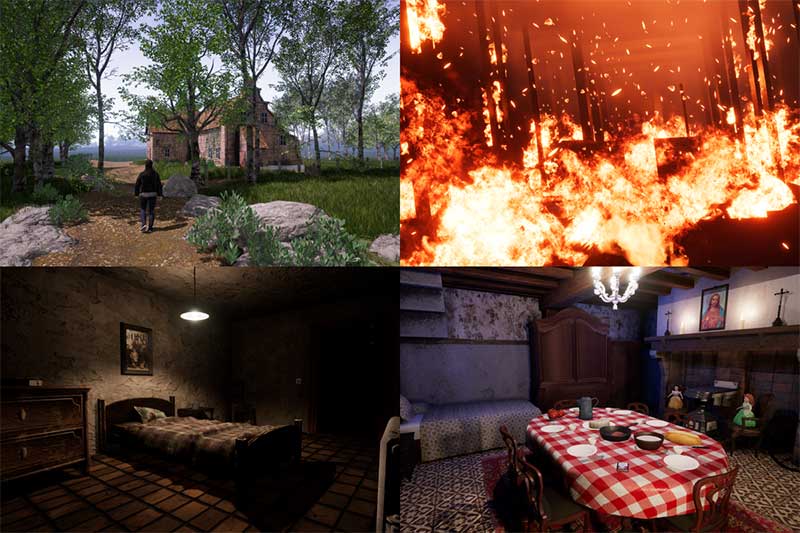Khoury News
Timeless games for ageless players: How Bob De Schutter builds games for forgotten audiences
When video game designers build their products, they almost always do it with young players in mind. Bob De Schutter takes a longer view, and with immersive storytelling as his tool of choice, he's targeting older gamers.

Bob De Schutter is not your typical game designer. He has spent more than a decade challenging how society and the gaming industry view older adults and play.
“My PhD is in communication science, my master’s degree is in arts, and I’ve been making games since I was a kid,” said De Schutter, who holds a joint appointment in Khoury College and the College of Arts, Media and Design. “I taught myself to program when I was around eight or ten because I wanted to make the kinds of games I loved playing.”
At a time when most game designers ignore players over 50 or target them only with brain-training apps, De Schutter offers a powerful alternative. His design, research, and teaching reflect a vision of older adults as lifelong players whose need for challenge, social connection, and meaningful interaction does not vanish with age.

De Schutter’s interest in the subject began during his doctoral work in social studies at Belgium’s KU Leuven. His early studies challenged common assumptions about aging and digital games, emphasizing that older adults are not simply passive recipients of cognitive training tools. Instead, they are diverse players who engage with games for many of the same reasons that young people do: fun, exploration, and connection. This research laid the foundation for what he termed “gerontoludic design” — a perspective that advocates for growth over decline, playfulness over utility, and diversity over one-size-fits-all solutions.
“It’s about making good games first and foremost,” said De Schutter. “The research is still important, but the goal is to make something meaningful and innovative.”
De Schutter founded Lifelong Games and has developed award-winning games including Brukel, a game that was inspired by conversations with his grandmother about her experiences during WWII. Brukel brings her story to life by placing players into a narrative that she lived and allowing them to understand her experiences.
“My grandmother used to tell me stories over lunch when I was a kid, everything from food shortages to moments where a single twist of fate meant our family survived,” he recalled.
The game merges immersive storytelling with historical preservation, inviting players into a deeply personal narrative space, according to This Gen Gaming. Players have a smartphone as they navigate throughout the home, and taking pictures unlocks the grandmother’s memories in the form of stories for the players. Brukel exemplifies what De Schutter calls “gaminiscing” — the use of digital games to evoke personal memories and foster intergenerational connection. The game has been recognized internationally for its emotional depth and innovative use of autobiographical material, earning a gold medal at the Serious Play Awards.
And now De Schutter plans to expand on it.
“With Brukel, you play for an hour, and you’ve experienced the whole story,” he said. “My current project, Restless, is similar in emotional impact but uses procedural generation so it can incorporate many different people’s stories and stay fresh each time you play.”
Alongside his creative work, De Schutter has been an influential education and academic leader.
“I coordinate the Game Science and Design program,” De Schutter said. “At CAMD, I'm teaching the game design class, the first class that all the students must take in the grad program. And then for the undergrads, I usually build a concept out in a semester, one that can be a portfolio piece. That’s where I can really bring in my indie development acumen.”
Beyond the classroom, De Schutter has played a central role in shaping the field of game studies. He is a member of the International Game Developers Association and IndieCade, as well as founder of the Flemish chapter of the Digital Games Research Association.
De Schutter’s recent research explores new frontiers in inclusive game design, particularly AI-supported accessibility and culturally grounded social play. In one project, he and his collaborators developed an adaptive gaming interface that uses AI to adjust difficulty, controls, and interface options based on a player’s physical or cognitive needs. These systems allow older adults to play games on their own terms without compromising the core experience.
“The generations that are coming into their fifties right now, they grew up with games; it was a big part of their lifestyle as a child or as a teen,” De Schutter said, noting the importance of helping the industry pivot and cater to this demographic.
De Schutter’s goals remain as ambitious as ever. This summer, he began working on a book exploring how lifelong gamers are the future of the gaming industry. He hopes to scale up his work in experimental game design, expand cross-cultural projects that honor the diversity of older players, and continue pushing the gaming industry to think beyond its youth-centric marketing and design. Through Lifelong Games, his academic collaborations, and his advocacy work, he’s helping to take Restless to market and to build a future in which games are truly for everyone — no matter their age.
“I want to grow the lab so that we can hire more students, hire more co-ops, and make more games,” he said. “By the time I retire, my output can be more games than papers.”
The Khoury Network: Be in the know
Subscribe now to our monthly newsletter for the latest stories and achievements of our students and faculty